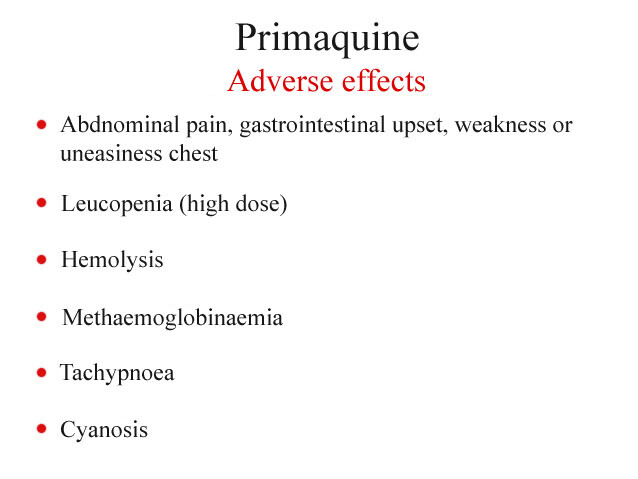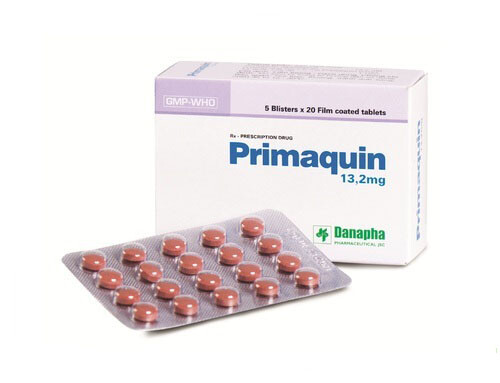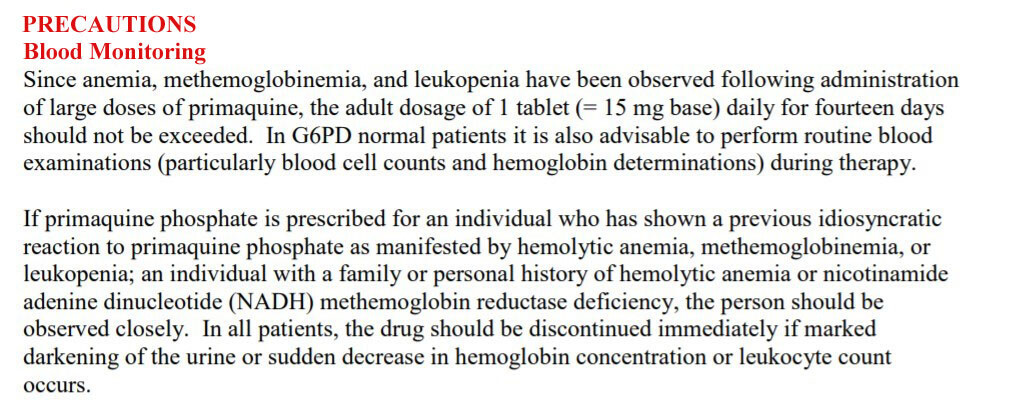Malaria is a serious and occasionally fatal medical condition caused by parasites. Most commonly, it is provoked by mosquito parasites that reach the human’s blood through bites. Nowadays, it does not refer to a disease that cannot be cured; however, a prompt diagnosis and treatment is a must to prevent complications. One of the medications prescribed to treat malaria is Primaquine. It is widely prescribed in areas where malaria is prominent, including Africa and Asia areas, Central and South America, Haiti, and the Dominican Republic, among others.
Learn more about what is drug Primaquine, its dosage, risks, and side effects.
What is Primaquine?
Primaquine is a prescription medication; the one recommended to treat malaria caused by mosquito bites. It is the first-line treatment in countries where malaria risk is high. Doctors prescribe it alongside other medications such as Chloroquine to achieve the highest therapeutic effect.
Today, it belongs to the class of drugs called antimalarials (antiprotozoals). The World Health Organization (WHO) also enlisted it in the group of Essential Medications.
Primaquine’s Mechanism of Action
Primaquine’s current mechanism of action is not clearly understood; however, it is believed to work by binding/affecting the protozoal DNA as well as producing reactive oxygen species and interfering with the parasite’s electron transport. Medical professionals admit that the medication is a lethal tool to Plasmodium vivax and Plasmodium ovale (parasites that cause malaria in humans) once they reach the liver and blood cells.
Malaria parasites upon reaching the human’s system break down the red blood cells, in particular, hemoglobin. They damage it and divide hemoglobin into two independent parts such as hemo and globin. Parasites cannot tolerate Hemo since it is toxic to them; thus, they produce certain chemicals making hemo a favorable environment. By taking medication, it affects the “health” of the parasites, especially interferes with their mitochondria, which is responsible for their energy. Once the medication affects it, the parasites die since they cannot live without energy. In short, the medication helps stop the infection and aims for a human’s recovery.
It is never used as the only agent to approach malaria but alongside other first-line medications. Beyond that, Primaquine’s known mechanism is not fit for the prevention of the disease.
What Is It Used for?
Today, a drug is approved by the Food and Drug Administration to treat malaria.
Generally, Primaquine uses may be classified as follows:
- to treat malaria, and prevent its onset or deterioration once a person is already infected;
- to treat Pneumocystis jiroveci pneumonia, which is a lung disease caused by a fungus (it is widely-spread in patients with AIDS and those assigned to immunosuppressive medications).
A doctor may occasionally inform one about other Primaquine common uses when first-line medications are helpless to affect one or another medical condition. One should discuss its intake with their healthcare provider only.
Primaquine Dosage and Duration
| Weight (kg) | Number of Primaquine tablets | Primaquine dose (mg) | Primaquine dose (mg/kg) |
| 10-17 | 0.5 | 7.5 | 0.44-0.75 |
| 18-25 | 1 | 15 | 0.6-0.83 |
| 26-35 | 1.5 | 22.5 | 0.64-0.87 |
| 36-45 | 2 | 30 | 0.67-0.83 |
| 46-55 | 2.5 | 37.5 | 0.69-0.82 |
| 56-75 | 3 | 45 | 0.64-0.82 |
| ≥76 | 4 | 60 | ≤0.78 |
Primaquine safe dosage is tailored individually. One should take it by mouth once per day with food to assist digestion and prevent an upset stomach. Otherwise, as directed by their healthcare provider.
Primaquine safe dose is usually prescribed for 2 weeks of intake after a person left the area with a high risk of malaria spread. It does not fit the long-term application; hence, the treatment should not exceed 14 days. It is prohibited to stop sticking to Primaquine’s known dosing regimen without a doctor’s approval if you feel better or do not experience any positive effect. A doctor will stick to the adjustment of a dose for a safe transition without side effects.
For Children
The recommended pediatric dose to treat malaria is 0.5 mg/kg once/per day over 2 weeks. The dosage should not exceed 30mg.
The recommended pediatric dose to treat Pneumocystis Pneumonia is 0.3 mg/kg once/per day. The dosage should not exceed 30mg.
For Adults
The adult’s dose for treating malaria is 15mg once/per day over 2 weeks. The dose is recommended as a radical cure or for the prevention of malaria relapse. It should be given alongside Chloroquine.
The adult’s dose for treating Pneumocystis Pneumonia is 30mg once/per day over 21 days. It should be taken alongside Clindamycin or other recommended first-line medications.
Please note, some patients may require another dosing regimen based on their current health conditions.
During Pregnancy
It is unknown whether a drug may be used safely in pregnant women; hence, it is contraindicated for their intake. Based on animal studies, medication has been linked to producing gene mutations, teratogenicity, and damage to the fetus.
Inform the doctor if you are pregnant or plan to become pregnant while taking a medication. There would be advice to prevent your pregnancy since the fetus may be damaged or born with gene mutations.
There is no need to stick to a certain diet while being prescribed a drug unless a doctor recommended otherwise. Do not exceed or lower the dose without speaking to your doctor since it may result in being ineffective or cause severe side effects or deterioration of your current health condition.
Symptoms of Overdose
Like any other medications, it may cause severe side effects, including overdose events when taken as not directed by a doctor.
Overdose symptoms are the following:
- abdominal cramps;
- cardiac arrhythmia and QT interval prolongation;
- vomiting and nausea;
- burning;
- epigastric distress;
- central nervous system and cardiovascular disturbances;
- cyanosis, methemoglobinemia, moderate leukocytosis or leukopenia, and anemia.
Note, this is not a full list of all overdose symptoms since they vary among patients.
If you believe you overdose, seek emergency help immediately and call 911. If you just feel bad, and your condition does not get worse, sit or lay down. If the symptoms multiply, and you cannot stand the pain, seek emergency help.
How Does It Interact With Other Drugs
A drug may interact with a number of other drugs and substances. First off, it concerns those patients who are currently assigned to medications to treat other health conditions. Secondly, it may involve herbals or health supplements as well since they may alter the efficacy of a drug. Pay attention to the following medications that are typically not recommended to interact.
Aurothioglucose
It is not recommended to use a drug alongside Aurothioglucose. It is a gold salt typically prescribed for therapeutic purposes when treating arthritis through intramuscular injection. It may be used for rheumatoid arthritis when first-line treatments are not effective enough or cause many severe side effects.
If you currently take Aurothioglucose, a doctor may make changes to your medication protocol either by stopping your current intake of a gold-salt or making changes to the dosages of both.
Levomethadyl
Levomethadyl is a known opioid analgesic prescribed to break down opioid dependence. It is a controlled substance that requires utmost supervision and caution. Do not take it alongside Primaquine, or side effects may occur.
Carbamazepine
This anticonvulsant medication is typically prescribed to approach epilepsy and neuropathic pain. Beyond that, it may be used to treat schizophrenia and bipolar disorder when first-line therapies are not effective or cause severe side effects. Interacting Primaquine with Carbamazepine should be avoided at all times.
Primaquine Side Effects
 Primaquine common side effects are mild to severe when a drug is not taken as directed. Do not change the dose to maximize the therapeutic effect or when you do not experience any effect without speaking to your healthcare provider.
Primaquine common side effects are mild to severe when a drug is not taken as directed. Do not change the dose to maximize the therapeutic effect or when you do not experience any effect without speaking to your healthcare provider.
Gastrointestinal
A medication may cause gastrointestinal alterations, including acute intravascular hemolysis,
methemoglobinemia, as well as immunosuppression through inhibition of lymphocyte proliferation. Beyond that, it is linked to an upset stomach, vomiting, and nausea. The latter symptoms bear temporary character and may be addressed by designated medications but only after receiving a doctor’s approval.
Hematologic
Its intake may be linked to a sudden loss of red blood cells. They, in turn, may result in deterioration of one health manifested by tiredness, changes in urine color, heartbeat alterations, methemoglobinemia, and headache, among others.
Cardiac
One may experience a fast, slow, or irregular heartbeat and many other heart diseases. A patient should inform a doctor about a family history of heart diseases or problems.
Nervous System
There is not much data confirming the effect of a drug on one’s nervous system, though one may experience tiredness or irritability. If you experience any changes with your nervous or mental health condition, address them to your healthcare provider.
Skin and Soft Tissue
A medication may cause severe allergy though it is rare. The side effects on one’s skin may be manifested by rash, itching, swelling, and trouble breathing, among others.
Note, some side effects bear a temporary character and vanish as soon as one’s system gets used to a drug. However, long-term effects may occur and should be addressed immediately to a doctor.
Warnings
Prior to starting the treatment with medication, you should speak to your healthcare provider to get a tailored dose and instructions. Some of the important warnings concerning the intake are the following.
Allergy
Events of allergic reactions to medication and its components are possible but rare. One may develop itching, rash, trouble breathing, dizziness, among others. You should reveal a full medical history to a doctor and ensure to speak to them about allergies to other medications and foods.
Alcohol Interaction
It is not recommended to take a drug with alcohol together due to the potential of dizziness or extreme relaxation. If you took Primaquine and some alcohol, please abstain from driving or operating heavy machinery since it may end up in injuries or death. Both substances may greatly affect your alertness. Do also inform a doctor about the intake of marijuana that should be avoided alongside medication for your own safety.
For People With Certain Health Conditions
Certain medical and health conditions should prevent you from taking a drug. Especially, it concerns immune system diseases, including rheumatoid arthritis and lupus. Then, it also concerns blood diseases or alterations such as anemia or white blood cell counts, hemolytic anemia, methemoglobinemia.
The intake of a drug may also affect the heart rhythms; thus, inform your doctor about the heart health you currently have. Also, disclose the medical history of all medical conditions in your family.
Pregnant Women
The drug should not be used in pregnant and nursing mothers. It may affect the fetus. It is highly recommended to prevent pregnancy while on and after the treatment with a drug with qualitative birth control.
Since it is unknown whether a drug passes into breast milk, nursing mothers should not take it as well.
Please, do also abstain from grapefruit-based products, and juice in particular, since it may affect the efficacy of a drug or cause side effects.
This is not a full list of all warnings and precautions. Discuss all medical nuances with your healthcare provider for your own safety. Do also refer to the FDA label of the drug to learn more.
Pros and Cons of Primaquine
Like other medications, Primaquine has its own benefits and drawbacks that are usually informed by one’s healthcare provider.
|
Pros |
Cons |
|
It is approved by the Food and Drug Administration to treat malaria; |
It cannot be classified as a very affordable medication; |
|
It can be prescribed to pediatric patients under close supervision; |
It does not fit pregnant and nursing mothers; |
|
It does not require a long-term intake; |
It has many limitations concerning the interactions with other medications; |
|
Allergic side effects are rare; |
It should be used only alongside other first-line medications. A typical combination is Chloroquine drug vs. Primaquine. |
|
It is highly effective in preventing relapse to malaria; |
|
|
It may be prescribed to treat Pneumocystis Pneumonia; |
|
If you want to learn more information about the dosing regimen, particularly for your case, speak to your doctor. In case of any side effects, or changes with your normal health state, speak to your doctor to prevent the deterioration. Do not diagnose or treat yourself with a drug following the online instructions, guidelines, and feedback of other patients who have suffered from malaria or Pneumocystis Pneumonia. It may be dangerous and result in overdose or even fatal events.


















